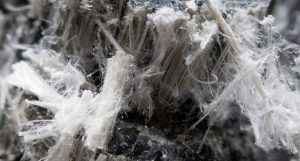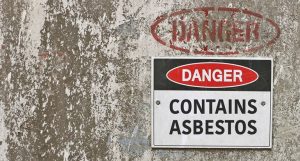Asbestos Exposure Causes Mesothelioma

The primary cause of mesothelioma is exposure to asbestos, a natural but harmful mineral that was used in many workplaces for decades.
Experts established decades ago that there is a close association between long-term exposure to asbestos and a diagnosis of malignant mesothelioma.
Most mesothelioma patients worked in jobs with repeated exposure to asbestos-containing materials over an extended period of time. Three-quarters of people with mesothelioma experienced asbestos exposure at some point.[2]
It is also important to note that not everyone exposed to asbestos develops mesothelioma. Other factors are at play that increase the risk that certain people exposed to asbestos will get sick later.
Who Is Most at Risk for Asbestos Exposure and Mesothelioma?
Some of the most common workplaces and jobs that put people at risk of asbestos exposure include:[3]
- Demolition and construction
- Building maintenance and renovation
- Shipyards and on ships, including in the U.S. Navy
- HVAC and other building maintenance work
- Automotive repair
- Manufacturing facilities and plants
- Other industrial settings
In most cases of malignant mesothelioma, there is a clear link between asbestos exposure and the development of cancer. Also at risk for exposure are people who live with workers in these jobs and industries.
Although the link between mesothelioma and asbestos is very clear, many workers don’t make the connection right away. This is because it can take 20 to 50 years for troubling symptoms of mesothelioma to develop after initial asbestos exposure.
What Is Asbestos?
Asbestos is a naturally occurring mineral that has insulating and fire-retardant qualities. It consists of tiny, thin fibers. Bundled together, these fibers make asbestos a strong and durable material.[4]
How Does Asbestos Cause Mesothelioma?

Several things happen when asbestos fibers come loose from a material, and a person inhales or ingests them:
- The fibers get embedded in the mesothelium, a thin membrane lining that covers several of the body’s organs.
- Embedded asbestos fibers trigger inflammation and damage to the tissue.
- In some people, this damage leads to the formation of cancerous tumors.[4]
- Pleural mesothelioma, cancer in the tissue around the lungs and chest cavity, is caused by inhaling asbestos fibers.
- Peritoneal mesothelioma in the abdominal cavity may result from ingesting asbestos fibers or from inhaled fibers migrating to the abdomen.
- Pericardial mesothelioma, in the lining of the heart, and testicular mesothelioma are also likely caused by asbestos fibers migrating through the body.[5]
Primary Asbestos Exposure
The first and most common mode of exposure to asbestos is primary occupational exposure, which can happen in many workplaces.
Primary exposure on the job occurs in any industry that uses asbestos materials. Asbestos was once common in insulation, fireproofing, and many construction and shipbuilding materials.
Secondary Asbestos Exposure
Secondary asbestos exposure is less common. It occurs when a person is in contact with someone primarily exposed to asbestos. Family members of workers exposed to asbestos may experience secondary exposure from their clothing, for instance.
Second-hand asbestos exposure can also result from living in an area where asbestos air pollution is an issue. This may occur in neighborhoods close to factories, industrial shipyards, mines, mills, and construction demolitions.[3]
Environmental Asbestos Exposure
The third and least common mode of exposure is contact with naturally occurring asbestos in the ground and in rocks and minerals.
This may occur when asbestos-containing earth or rocks are disturbed during mining, construction, or road building.[3]
Other Types of Exposure
Some people may have been exposed to asbestos through contamination of other materials. Several lawsuits are currently underway against manufacturers of talcum powder products that may have contained asbestos.
Studies have found that these products can be contaminated with asbestos because talc is also a natural mineral. If it is not purified after mining, contaminants can remain and cause ovarian cancer or mesothelioma in regular users.[6]
How Much Asbestos Exposure Is Harmful?
There is no safe level of asbestos exposure. Even short-term exposure to trace amounts of asbestos fibers has been linked with mesothelioma diagnoses. Longer-term exposure to larger quantities of asbestos increases the risk of illness.
Does Everyone Exposed to Asbestos Develop Mesothelioma?
No, not everyone exposed will become sick. Mesothelioma is a rare cancer, in spite of the extensive exposure that occurred over decades of peak asbestos use.
Why some people are more vulnerable to asbestos illnesses than others is not clear. Genetics are likely to play a role.
Does Anything Else Cause Mesothelioma?
Although asbestos exposure is the most common cause of this rare cancer, research indicates this is not the only factor.[7] Other things may predispose a person to cancer, especially if combined with asbestos exposure.
Genetics
The ultimate cause of any cancer is one or more mutations in an individual’s DNA. DNA is a large molecule that contains all of a person’s genes. These can become mutated or changed, sometimes randomly, other times triggered by things like radiation or asbestos fibers.
Research continues to identify several ways genes play a role in mesothelioma:
- Asbestos is thought to cause mutations in the DNA of the cells in the mesothelium, which most likely leads to the development of cancer.
- Not everyone who inhales asbestos fibers develops mesothelioma or any type of cancer.
- This means that some people have genes that make them more susceptible to the damage and the mutations caused by asbestos.
- Research shows that people at high risk for mesothelioma have mutations in a gene called BAP1.[8] This gene, when not changed, is responsible for preventing cell growth from getting out of control. If that gene is damaged, it could cause uncontrolled cell growth or cancer.
- BAP1 may also confer a less aggressive form of the disease in those who have certain changes in the gene and develop mesothelioma.
- Discuss all family history of cancer with your care team to determine if genetic testing is appropriate. This information may be helpful to your disease management and overall prognosis.
Radiation Exposure
Researchers have described a few cases of patients who developed mesothelioma after receiving considerable doses of radiation to the chest or abdomen as part of treatment for another form of cancer.[9]
Radiation can contribute to mesothelioma by mutating DNA. This is possible but still rare.
The SV40 Virus
Simian virus 40, also known as SV40, is a virus found in both humans and other primates. Infection with the virus may not produce symptoms and may simply stay in the body for an extended period of time.
Studies have found that it can cause cancer in some humans and animals exposed to the virus. SV40 has been implicated as a possible risk factor for mesothelioma, but the evidence is limited.
Between 1955 and 1963, some people who received the polio vaccine mistakenly received doses of SV40. Nearly thirty million people were exposed, and some experts think this may have increased the risk of developing mesothelioma within this group. Exposure to SV40 today is unlikely.[10]
Carbon Nanotubes
Carbon nanotubes are increasingly important in research and manufacturing. They help make products, like electronics and automotive parts, lighter and stronger.
A few recent cases of mesothelioma developed in people who worked with carbon nanotubes.[11] More study is needed, but there may be a link between inhaling these tiny fibers and developing cancer.
What Are Other Risk Factors for Mesothelioma?
Other risk factors may not directly cause mesothelioma, but they increase the risk. For example, people who smoke and are exposed to asbestos are more likely to develop mesothelioma than non-smokers exposed to asbestos.
Other risk factors include:[12]
- Being male
- Being over the age of forty-five
- Exposure to a mineral group known as zeolites
Does Smoking Cause Mesothelioma?
Smoking alone is not a cause of mesothelioma. However, it can contribute to the poor health effects of asbestos exposure.
- One study found that smoking, asbestos exposure, and asbestosis together combine to increase fatalities in lung cancer patients.[13]
- Another study found that exposure to tobacco smoke early in life can increase the risk of developing an asbestos-related disease. Researchers showed that secondhand smoke triggers changes in developing lungs that make them more vulnerable to asbestos exposure effects later in life.[14]
Quitting smoking if you receive a mesothelioma diagnosis is essential for a better outcome. Smoking may not cause this cancer, but it can make you more vulnerable to symptoms and less able to continue treatment.
Is Mesothelioma Preventable?
Most cases of mesothelioma could have been prevented by preventing exposure to asbestos. Unfortunately, many people encountered asbestos before they knew about the risks.
Asbestos is not gone. It lingers in workplaces, buildings, and natural deposits. You can take steps to reduce your risk of exposure and prevent a future mesothelioma diagnosis:
- Assess the risk at your workplace. Find out if asbestos is present.
- If asbestos is in your workplace, ask about safety guidelines and follow them.
- Report your employer to the Occupational Safety and Health Administration if they fail to provide you with appropriate safety measures.[15]
- If your home was built before 1980, consider having an asbestos inspection.
- Do not proceed with any renovations in your home without a trained asbestos inspector going through it.
- If you find asbestos in your home, hire abatement professionals to safely contain or remove it.
Asbestos Is Still the Primary Cause of Mesothelioma
The study of mesothelioma and its causes continues. However, occupational asbestos exposure over the long term is still the main cause and leading risk factor of malignant mesothelioma cancer.
These recent findings suggest that there may also be other factors that influence the development of mesothelioma, but asbestos is still the number one culprit.
Because mesothelioma is so aggressive and deadly, finding other factors that work with asbestos damage to cause it is incredibly important for prevention and early diagnosis.

What Should I Do if I Was Exposed to Asbestos?
Knowing mesothelioma’s primary causes and risk factors increases a patient’s probability of catching the disease in its early stages.
If you suspect that you or someone you know is at risk of developing mesothelioma based on their history, please seek medical attention as soon as possible.
Start with your usual doctor and ask about cancer screenings. If you aren’t satisfied with their response or they don’t take you seriously, seek a second opinion.
Symptoms and warning signs may be undetectable for many years, and the sooner a doctor is able to make a diagnosis, the sooner you can start treatment.

Mary Ellen Ellis
WriterMary Ellen Ellis has been the head writer for Mesothelioma.net since 2016. With hundreds of mesothelioma and asbestos articles to her credit, she is one of the most experienced writers on these topics. Her degrees and background in science and education help her explain complicated medical topics for a wider audience. Mary Ellen takes pride in providing her readers with the critical information they need following a diagnosis of an asbestos-related illness.

Luis Argote-Greene, M.D.
Medical Reviewer and EditorLuis Argote-Greene is an internationally recognized thoracic and esophageal surgeon. He has trained and worked with some of the most prominently known thoracic surgeons in the United States and Mexico, including pioneering mesothelioma surgeon Dr. David Sugarbaker. He has a fellowship in oncology at Ascension Texas in Austin and is Associate Professor at the University of Texas Austin Dell Medical School. Dr. Argote-Greene previously served as Regional Director of Thoracic and Cardiovascular Surgery at Cleveland Clinic Florida. His areas of interest and expertise are mesothelioma, mediastinal tumors, thoracic malignancies, lung cancer, lung transplantation, esophageal cancer, experimental surgery, and lung volume reduction. Dr. Argote-Greene has also done pioneering work with video-assisted thoracoscopic surgery (VATS), as well as robotic assisted minimally invasive surgery. He has taught the procedures to other surgeons both nationally and internationally.
References
- American Cancer Society. (2018, November 16). What Causes Malignant Mesothelioma.
Retrieved from: https://www.cancer.org/cancer/malignant-mesothelioma/causes-risks-prevention/what-causes.html - WebMD. (2017, July 14). Mesothelioma: Causes and Symptoms.
Retrieved from: https://www.webmd.com/lung/mesothelioma-causes-and-symptoms#1 - Centers for Disease Control and Prevention (2023, May 19). Who is at Risk of Exposure to Asbestos?
Retrieved from: https://archive.cdc.gov/www_atsdr_cdc_gov/csem/asbestos/who_is_at_risk.html - National Institutes of Health, National Cancer Institute. (2017, June 7). Asbestos Exposure and Cancer Risk.
Retrieved from: https://www.cancer.gov/about-cancer/causes-prevention/risk/substances/asbestos/asbestos-fact-sheet - Mayo Clinic. (2024, December 5). Mesothelioma.
Retrieved from: https://www.mayoclinic.org/diseases-conditions/mesothelioma/symptoms-causes/syc-20375022 - Gordon, R.E., Fitzgerand, S., and Millette, J. (2014, October). Asbestos in Commercial Cosmetic Talcum Powder as a Cause of Mesothelioma in Women. Int. J. Occup. Environ. Health. 20(4), 318-32.
Retrieved from: https://www.ncbi.nlm.nih.gov/pmc/articles/PMC4164883/ - Jasani, B. & Gibbs, A. (2012). Mesothelioma Not Associated with Asbestos Exposure. Arch. Pathol. Lab. Med., 136(3), 262-7.
Retrieved from: https://www.ncbi.nlm.nih.gov/pubmed/22372902 - Carbone, M., Ferris, L., Baumann, F., Napolitano, A., Lum, C., & Flores, E. et al. (2012, August 30). BAP1 Cancer Syndrome: Malignant Mesothelioma, Uveal and Cutaneous Melanoma, and MBAITs. Journal Of Translational Medicine, 10(1). doi: 10.1186/1479-5876-10-179
Retrieved from: https://translational-medicine.biomedcentral.com/articles/10.1186/1479-5876-10-179 - Farioli A., Ottone, M., Morganti, A.G., Compagnone, G., Romani, F., Cammelli, S., Mattioli, S. and Violante, F.S. (2016, May). Radiation-Induced Mesothelioma Among Long-Term Solid Cancer Survivors: A Longitudinal Analysis of SEER Database. Cancer. Med. 5(5), 950-9.
Retrieved from: https://www.ncbi.nlm.nih.gov/pubmed/26860323 - Qi, F., Carbone, M., Yang, H. and Gaudino, G. (2011, October). Simian Virus 40 Transformation, Malignant Mesothelioma and Brain Tumors. Expert. Rev. Respir. Med. 5(5), 683-97.
Retrieved from: https://www.ncbi.nlm.nih.gov/pmc/articles/PMC3241931/ - Chernova, T., Murphy, F.A., Galavotti, S., Sun, X., Powley, I.R., Grosso, S., Schinwald, A., Zacarias-Cabeza, J., Dudek, K.M., Dinsdale, D., Le Quesne, J., Bennitt, J., Nakas, A., Greaves, P, Poland, C.A., Donaldson, K., Bushell, M., Willis, A.E. and MacFarlane, M. (2017, November 6). Long-Fiber Carbon Nanotubes Replicate Asbestos-Induced Mesothelioma with Disruption of the Tumor Suppressor Gene Cdkn2a (Ink4a/Arf). Curr. Biol. 27(21), 3302-14.
Retrieved from: https://www.ncbi.nlm.nih.gov/pmc/articles/PMC5681354/ - American Cancer Society. (2018, November 16). Risk Factors for Malignant Mesothelioma.
Retrieved from: https://www.cancer.org/cancer/malignant-mesothelioma/causes-risks-prevention/risk-factors.html - Science Daily. (2013, April 12). Asbestos Exposure, Asbestosis, and Smoking Combined Greatly Increase Lung Cancer Risk.
Retrieved from: https://www.sciencedaily.com/releases/2013/04/130412084227.htm - Brown, T.A., Holian, A., Pinkerton, K.E., Lee, J.W., and Cho, Y.H. (2016, July). Early Life Exposure to Environmental Tobacco Smoke Alters Immune Response to Asbestos Via a Shift in Inflammatory Phenotype Resulting in Increased Disease Development. Inhal. Toxicol. 28(8), 349-56.
Retrieved from: http://europepmc.org/backend/ptpmcrender.fcgi?accid=PMC5109924&blobtype=pdf - United States Department of Labor. Occupational Safety and Health Administration. (n.d.). File a Complaint.
Retrieved from: https://www.osha.gov/workers/file-complaint


